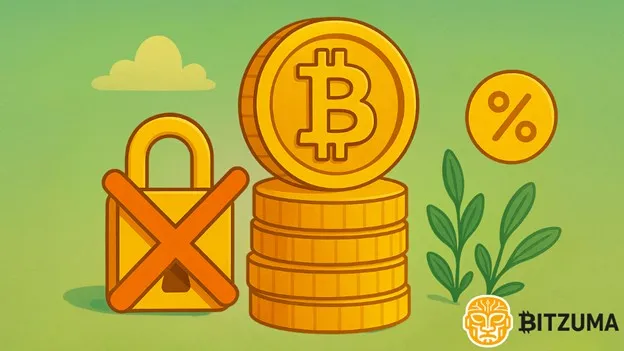Earning passive income from your crypto is one of the most appealing aspects of the blockchain economy — but what if you don’t want to lock your funds for months at a time? Fortunately, many platforms now offer flexible staking or no lock period options, allowing you to earn rewards while keeping full access to your coins.
In this guide, we explore the top crypto staking platforms with no lock period in 2025 — including centralized exchanges, DeFi protocols, and yield aggregators.
Table of Contents
ToggleRelated posts
Top 7 Staking Platforms with No Lock Period
If you want to earn passive income without locking up your crypto, flexible staking platforms are the way to go. They let you earn daily or weekly rewards — and still give you full access to your assets anytime. No commitment, no penalties, no stress.
After reviewing dozens of options, here are the 7 best no-lock staking platforms in 2025 for flexibility, APY, and ease of use.
1. Binance Earn
Binance Earn is one of the most user-friendly options for flexible staking, especially for beginners entering the crypto space. It supports a wide range of assets — from stablecoins to top altcoins — and offers Flexible Savings and Auto-Invest options. The dashboard is clear and intuitive, and rewards are paid out daily.
🔍 Key Info
- Type: Centralized
- APY: ~1%–12%
- Native Token: BNB
| ✅ Pros | ⚠️ Cons |
| Easy to use, even for newcomers | Centralized (not your keys) |
| Huge variety of supported tokens | APYs fluctuate frequently |
| No lock-up period (Flexible Earn) | Yields lower than some DeFi apps |
2. Lido Finance
Lido is a leading decentralized staking protocol focused on liquid staking. When you stake ETH (or MATIC, DOT, etc.) on Lido, you receive stTokens like stETH, which represent your staked funds and can be used across DeFi protocols like Aave or Curve. This allows you to earn twice — staking rewards + DeFi yield.
🔍 Key Info
- Type: DeFi (Liquid Staking)
- APY: ~3.5% (ETH)
- Native Token: LDO
| ✅ Pros | ⚠️ Cons |
| stTokens are tradable anytime | Requires DeFi wallet & knowledge |
| Fully non-custodial, decentralized | Smart contract risk |
| Widely integrated in the DeFi ecosystem | Some yield variance over time |
3. Coinbase Staking
Coinbase offers one of the most beginner-friendly staking services. It provides auto-staking with rewards automatically added to your account, and a clean UI that’s great for U.S. users and institutional investors. While APYs are modest, the regulatory clarity and ease of use make it a safe pick for conservative users.
🔍 Key Info
- Type: Centralized
- APY: ~3%–5%
- Native Token: N/A
| ✅ Pros | ⚠️ Cons |
| Great UI and educational content | Limited token support |
| Regulated and insured in the U.S. | Slightly higher fees |
| Auto-compounding rewards | Not available in all regions |
4. Kraken Staking
Kraken Earn offers both bonded and flexible staking, depending on the asset. It has a long-standing reputation for security, compliance, and user support. You’ll find staking for popular assets like ETH, DOT, ATOM, and XTZ. While the interface isn’t as sleek, the reliability is top-notch.
🔍 Key Info
- Type: Centralized
- APY: ~1%–18%
- Native Token: N/A
| ✅ Pros | ⚠️ Cons |
| Highly trusted and transparent | Interface is less modern |
| Some assets support no-lock staking | Not all tokens are flexible |
| In-depth analytics and staking guides | Availability varies by country |
5. Rocket Pool
Rocket Pool is an Ethereum-only staking protocol that lets you stake as little as 0.01 ETH and receive rETH, a liquid token that appreciates over time. It’s fully decentralized, and you don’t need to run a node or trust a third party. The platform is well-audited and widely used across the DeFi space.
🔍 Key Info
- Type: DeFi
- APY: ~3.5%
- Native Token: RPL
| ✅ Pros | ⚠️ Cons |
| No minimum staking requirement | Only supports ETH |
| rETH usable across DeFi platforms | Requires MetaMask or similar |
| Fully decentralized & audited | Slightly more technical to use |
6. eToro Staking
eToro is a social trading platform that also offers crypto staking. While limited in tokens and rewards, it’s great for users already on eToro who want passive yield without moving funds elsewhere. It’s regulated, secure, and well-suited to casual investors who want simplicity.
🔍 Key Info
- Type: Centralized Broker
- APY: ~1%–5%
- Native Token: N/A
| ✅ Pros | ⚠️ Cons |
| Great for crypto newcomers | Small selection of stakeable coins |
| Regulated and insured | Lower APYs vs. DeFi/CEXs |
| No technical knowledge required | No on-chain liquidity/tokenization |
7. OKX Earn
OKX Earn is a staking aggregator that blends CeFi convenience with DeFi options. Users can stake with no lock on many tokens, while also accessing high-yield strategies through its Web3 interface. It’s a powerful platform for both casual and advanced users.
🔍 Key Info
- Type: Centralized + DeFi access
- APY: ~3%–20%
- Native Token: OKB
| ✅ Pros | ⚠️ Cons |
| Wide range of staking products | UX may overwhelm first-timers |
| Optional access to DeFi strategies | Not as regulated as Coinbase |
| Great mobile app and staking tutorials | Some DeFi options incur gas fees |
How to Choose a Staking Platform (No Lock)
Choosing a staking platform with no lock-in period depends on your priorities:
- If you want ease of use and safety, centralized exchanges like Binance or Coinbase are ideal.
- For higher APY and decentralization, DeFi tools like Lido or staking through Ledger are better.
- If you’re staking large sums and need custody, consider professional services like Finoa.
Always check fees, minimum staking amounts, and whether you receive real-time rewards or delayed payouts. And remember: if it’s DeFi, you must secure your wallet properly.









